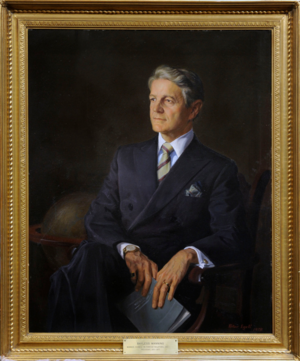Bayless Manning
( lawyer, academic) | |||||||||||||||||||||||
|---|---|---|---|---|---|---|---|---|---|---|---|---|---|---|---|---|---|---|---|---|---|---|---|
 | |||||||||||||||||||||||
| Born | March 29, 1923 Oklahoma, USA | ||||||||||||||||||||||
| Died | September 18, 2011 (Age 88) | ||||||||||||||||||||||
| Nationality | US | ||||||||||||||||||||||
| Alma mater | Yale University | ||||||||||||||||||||||
| Spouse | Alexandra Zekovic | ||||||||||||||||||||||
| Member of | Bohemian Grove, Council on Foreign Relations/Historical Members | ||||||||||||||||||||||
US corporate law expert. Attended 1972 Bilderberg conference as president of the Council on Foreign Relations. TLC.
| |||||||||||||||||||||||
Bayless Andrew Manning was an American lawyer, law professor, writer and expert of corporate law who proposed to merge law studies with business school[1]. He was dean of Stanford Law School from 1964 to 1971.[2]
He left Stanford in 1971 and became the first president of the Council on Foreign Relations,[1][3] when attended the 1972 Bilderberg conference.
Background
Manning was born in Bristol, Oklahoma. He spent much of his childhood in Washington, D.C. and later attended B.M.C. Durfee High School in Fall Rivers, Massachusetts. At 19, he became one of the Army cryptanalysts who during World War II helped break the Japanese naval code, which helped the United States win a military victory at Midway.
He studied law at Yale University, where he graduated first in his class in 1949 and was Editor-in-chief of the Yale Law Journal. Following law school, he clerked for Associate Justice of the United States Supreme Court Stanley Reed.[1]
Career
Manning taught as a professor at Yale University from 1955 to 1964.[1] He helped to organize the Peace Corps program in Latin America, did research for the CIA, helped to draft the 1962 Trade Extension Act, and worked for NATO on the problems of a multinational nuclear force.[2]
He promoted interdisciplinary study, especially in law, business and economics, and established the joint graduate law and business degree.[2] In 2008, during an oral history interview, Manning said "this was the platform out of which arose business school connections and the whole notion that a student could go to a business and law school at the same time and get credit in one for the other".[2]
He simultaneously was a member of the President's Advisory Panel on Ethics and Conflicts of Interest in Government beginning in 1960.[1] Manning became the dean of Stanford Law School from 1964 to 1971.[1] In 1971, Cyrus R. Vance and David Rockefeller soon appointed Manning to the newly created post of president of the Council of Foreign Relations (CFR).[1][3]
Following the end of his tenure at CFR, Manning joined Paul, Weiss, Rifkind, Wharton & Garrison, a law firm based in New York City.[1]
Event Participated in
| Event | Start | End | Location(s) | Description |
|---|---|---|---|---|
| Bilderberg/1972 | 21 April 1972 | 23 April 1972 | Belgium Hotel La Reserve Knokke | The 21st Bilderberg, 102 guests. It spawned the Trilateral Commission. |
References
- ↑ Jump up to: a b c d e f g h http://www.idahostatesman.com/2011/09/21/1807357/bayless-manning-the-shiniest-fish.html
- ↑ Jump up to: a b c d https://web.archive.org/web/20110924214407/http://blogs.law.stanford.edu/newsfeed/2011/09/23/stanford-law-school-mourns-the-loss-of-bayless-manning-former-dean-and-corporate-law-scholar/
- ↑ Jump up to: a b http://www.cfr.org/about/history/cfr/second_transformation.html
Wikipedia is not affiliated with Wikispooks. Original page source here